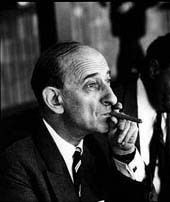
Back ريمون آرون Arabic ريمون آرون ARZ Raymond Aron AST Raymon Aron Azerbaijani Реймон Арон Bulgarian Raymond Aron Catalan Raymond Aron Czech Raymond Aron Welsh Raymond Aron German Ραϋμόν Αρόν Greek
Raymond Aron | |
|---|---|
 Raymond Aron (1966) by Erling Mandelmann | |
| Born | 14 March 1905 6th arrondissement of Paris, France |
| Died | 17 October 1983 (aged 78)[1] 4th arrondissement of Paris, France |
| Resting place | Montparnasse Cemetery, Paris |
| Education | École Normale Supérieure, University of Paris[2] (Dr ès l) |
| Era | 20th-century philosophy |
| Region | Western philosophy |
| School | Continental philosophy French liberalism |
Main interests | Political philosophy |
Notable ideas | Marxism as the opium of intellectuals |
| This article is part of a series on |
| Liberalism in France |
|---|
 |
Raymond Claude Ferdinand Aron (French: [ʁɛmɔ̃ aʁɔ̃]; 14 March 1905 – 17 October 1983) was a French philosopher, sociologist, political scientist, historian and journalist, one of France's most prominent thinkers of the 20th century.
Aron is best known for his 1955 book The Opium of the Intellectuals, the title of which inverts Karl Marx's claim that religion was the opium of the people; he argues that Marxism was the opium of the intellectuals in post-war France. In the book, Aron chastised French intellectuals for what he described as their harsh criticism of capitalism and democracy and their simultaneous defense of the actions of the communist governments of the East. Critic Roger Kimball suggests that Opium is "a seminal book of the twentieth century".[6] Aron is also known for his lifelong friendship, sometimes fractious, with philosopher Jean-Paul Sartre.[7] The saying "Better be wrong with Sartre than right with Aron" became popular among French intellectuals.[8]
Considered by many as a voice of moderation in politics,[9] Aron had many disciples on both the political left and right; he remarked that he personally was "more of a left-wing Aronian than a right-wing one".[10] Aron wrote extensively on a wide range of other topics. Citing the breadth and quality of Aron's writings, historian James R. Garland suggests, "Though he may be little known in America, Raymond Aron arguably stood as the preeminent example of French intellectualism for much of the twentieth century."[11]
- ^ Hoffmann, Stanley (8 December 1983). "Raymond Aron (1905–1983)". The New York Review of Books. Retrieved 10 June 2014.
- ^ At the time, the ENS was part of the University of Paris according to the decree of 10 November 1903.
- ^ a b Brian C. Anderson, Raymond Aron: The Recovery of the Political, Rowman & Littlefield Publishers, 2000, p. 3.
- ^ Raymond Aron, Les Étapes de la pensée sociologique, Introduction.
- ^ Brandom, Eric (2016). "Liberalism and Rationalism at the Revue de Métaphysique Et de Morale, 1902–1903". French Historical Studies. 39 (4): 749–780. doi:10.1215/00161071-3602256.
- ^ Kimball, Roger (2001). "Aron & the power of ideas". New Criterion, May 2001.
- ^ Memoirs: Fifty Years of Political Reflection, Raymond Aron (1990).
- ^ Poirier, Agnès (1 May 2018). "May '68: What Legacy?". The Paris Review. Retrieved 30 December 2020.
- ^ Rosenblatt, Helena; Geenens, Raf (2012). French Liberalism from Montesquieu to the Present Day. Cambridge University Press. pp. 271–291.
- ^ Sawyer, Stephen W.; Stewart, Iain (2016). In Search of the Liberal Moment: Democracy, Anti-totalitarianism, and Intellectual Politics in France Since 1950. Palgrave Macmillan US. p. 25.
- ^ Garland, James R. "Raymond Aron and the Intellectuals: Arguments Supportive of Libertarianism." Journal of Libertarian Studies, Vol. 21, No. 3 (Fall 2007).
© MMXXIII Rich X Search. We shall prevail. All rights reserved. Rich X Search